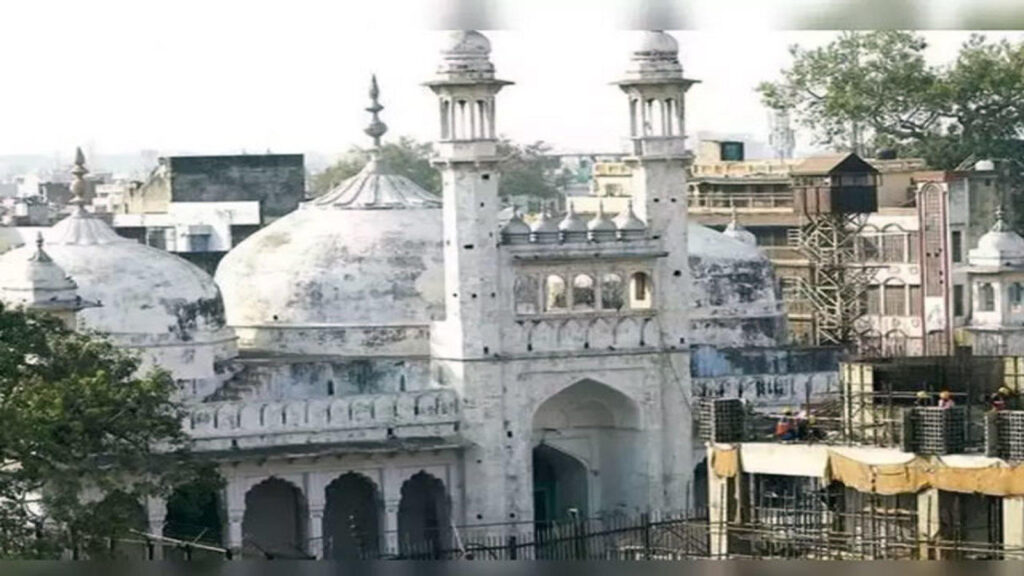Gyanvapi: Muslims To Peacefully Keep Shutters Down In Varanasi Today
Feb 2, 2024 | Pratirodh Bureau
FILE PHOTO: The appeal issued by Shahar-e-Mufti Abdul Batin Nomani said that leaders of the weavers' community and those responsible for other areas (Dal Mandi, Nai Sadak, Nadesa, Ardali Bazaar, etc.) should convey this appeal to the people in a peaceful and convenient manner
In protest against puja performed in the southern cellar of the Gyanvapi mosque — a day after the district court allowed such prayers — the Anjuman Intezamia Masjid Committee (AIMC), which manages Gyanvapi mosque, has appealed to people of the Muslim community to keep their shops closed on Friday, 2 February, while maintaining peace and tranquility.
This decision was taken at a meeting of prominent members of the Muslim community held with clerics on Thursday, 1 February.
“As you all are aware of the matter that on the basis of the order of the court of the district judge, Varanasi, the district administration has hastily made arrangements for worship in the southern basement of Gyanvapi Masjid, Banaras, and the worship has also started there. In view of this situation, a meeting of office bearers of AIMC with the Ulema (clerics) and prominent people of the community in the city was held. In the meeting, a decision was taken that on Friday, all shops and businesses will be kept closed in a peaceful manner, and people of the community should remain busy in prayers while staying in their respective cities and areas,” read the appeal issued by Shahar-e-Mufti and AIMC General Secretary Maulana Abdul Batin Nomani.
The appeal read further, “In connection with the closing (of shops and businesses), everyone is instructed to maintain complete peace and tranquillity and avoid going anywhere without any reason.” People belonging to the community were also instructed to offer Friday prayers (Jumma Namaz).
The appeal said that leaders of the weavers’ community and those responsible for other areas (Dal Mandi, Nai Sadak, Nadesa, Ardali Bazaar, etc.) should convey this appeal to the people in a peaceful and convenient manner.
The appeal issued by Shahar-e-Mufti Abdul Batin Nomani read that women should stay in their homes and offer prayers; marriage and other rituals should be organised with simplicity.
The Gyanvapi mosque has had a chequered history over the centuries. Under British Raj, the Gyanvapi, which was once the subject of whimsical Mughal politics, got transformed into a site of perennial contestation between local Hindus and Muslims, spawning numerous legal suits and even, riots. A new generation of aristocrats and well-to-do traders took over the role exclusively played by petty rulers in late-Mughal India in controlling the ritual life of the city, most often under the guise of urbanization. The construction of mosque had sought to air an “explicitly political and visual” assertion about the Mughal command over the city’s religious sphere but instead, “transmuted Vishweshwur into the undisputed fulcrum of the city’s ritual landscape”.
In March 1959, Hindu Mahasabha conducted a Rudrabhishek ceremony at the mosque pavilion on the occasion of Maha Shivaratri. Two of their workers were subsequently sentenced to six months of imprisonment for violating law and order. This spurred fellow Mahasabha-ites to mount routine agitations at the mosque pavilion across the next few months, demanding the restoration of the temple; by July, two hundred and ninety one “satyagrahis” spread across twenty three batches had courted arrest and served imprisonments of varying duration.
In November, the annual meeting of RSS adopted a resolution to similar effects. The site continues to remain volatile. Access to the mosque remains prohibited for non-Muslims, photography is prohibited, the approaching alleys have light police-pickets (alongside RAF units), the walls are fenced with barbed wire, and a watchtower exists too.
